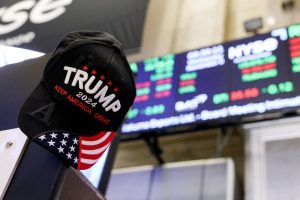A clash between BlackRock (BLK) and the FDIC over the money manager’s holdings of US banks will now play out in the waning days of President Joe Biden’s administration.
The FDIC has asked BlackRock to sign by Jan. 10 a so-called “passivity agreement” that would codify greater checks on the money manager’s holdings of FDIC-supervised lenders, according to people familiar with the matter, pushing back a deadline that previously was Dec. 31 of this year.
The agreement FDIC has asked BlackRock to sign is similar to one announced last week with another giant money manager, Vanguard Group, that imposes new compliance requirements when the manager amasses more than 10% of all outstanding stock in a FDIC-supervised bank.
BlackRock has spent much of 2024 resisting the FDIC’s push for greater oversight, denying that the asset manager exerts undue control over companies through its investment stewardship activities.
As recently as December, the giant Wall Street firm proposed an arrangement with the FDIC that didn’t include the same level of oversight agreed to by Vanguard. The FDIC did not respond to BlackRock’s proposal until announcing its Vanguard settlement, according to one of the people familiar with the matter.
The tug of war between BlackRock and FDIC is the latest example of rising DC scrutiny of BlackRock, which oversees $11 trillion in assets.
The financial giant has for years been a target of GOP attacks about “woke” investing, with Republicans raising concerns about whether BlackRock’s massive holdings in US corporations force companies to adopt environmental, social and governance (ESG) standards.
And Democrats have for years also been leery about whether the heft of BlackRock could pose risks to the financial system.
The “passivity” agreement FDIC wants BlackRock to sign is designed to assure bank regulators that the giant money manager will remain a “passive” owner of a FDIC-supervised bank and won’t exert control over a bank’s board.
Currently, BlackRock only has such an agreement with the Federal Reserve. Now the FDIC wants its own agreement with the money manager, which is also permitted under law.
In July, FDIC board member Rohit Chopra described the FDIC’s lack of oversight of passive asset manager stakes as “highly inappropriate” and a shirking of “the responsibility Congress entrusted to us.”
“Certain sectors of our economy are critical infrastructure for our country,” added Chopra, who is also the director of the Consumer Financial Protection Bureau. “We don’t let just anyone own a nuclear power plant or operate a bridge.”


